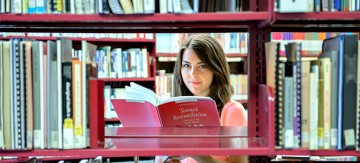A new seminar on the effects of Canada’s residential schools gives students a chance to contribute to something bigger than themselves

Erica Baker is the coordinator for a student-directed seminar on reconciliation. Photo: Don Erhardt.
Talking about Canada’s past with Indian residential schools – and how to move forward – can be a sensitive subject, but one Erica Baker refuses to shy away from.
The UBC student is the course coordinator for a student-directed seminar on reconciliation, a first for the First Nations Studies program.
“As a non-Indigenous person in First Nations studies, I’ve always been interested in figuring out what my place is and what my role is as an ally,” says Baker.
The course, The Politics of Indigenous-Settler Reconciliation in Canada, starts in September and will see students lead discussions on the topic. The course is open to students from any discipline. A student at UBC is allowed to take one student-directed seminar during their four-year degree.
Learning from history
The current reconciliation movement stems largely from Canada’s Indian residential school system that forced thousands of First Nations children from their homes and placed them in strict boarding schools where many were physically and sexually abused. Some were also used as test subjects in research experiments.
According to Baker, who is entering her final year at UBC, the course is a chance for students to understand and contribute to something bigger than themselves.
“As a non-Indigenous person in First Nations studies, I’ve always been interested in figuring out what my place is and what my role is as an ally.” -Erica Baker.
Those enrolled in the course will conduct research for Indigenous Foundations, a website providing information and resources to the UBC community and the public on Aboriginal-related issues.
“Indigenous people are often still seen through a lens of deficiency or lack rather than being seen as having a really significant role to play in major issues of concern, such as climate change, governance, economic and environmental justice,” says Daniel Justice, associate professor of First Nations Studies and English and the seminar’s faculty sponsor.
A day of reconciliation
This fall, The Truth and Reconciliation Commission of Canada is hosting the last of its National Events in Vancouver from September 16 to 21. The group collects testimonies from residential school survivors. UBC is suspending classes on its Vancouver campus on Sept. 18 to encourage the campus community to participate.
“I hope people utilize what the day presents,” Baker says. “It’s a significant event in our lived history and an important opportunity to be a witness and actively engage with what’s happening.”
A part of the course’s requirements is having students attend three events in the city, which could include the National Event. Justice says this will allow for students to gain a more sophisticated understanding of reconciliation as a concept, offering a glimpse of what efforts towards reconciliation look like on the ground.
For Baker, mending the relationship between Aboriginal and non-Aboriginal communities in Canada is not the responsibility of any single group.
“It takes non-Indigenous and Indigenous people to work together to create a shared practice of decolonization that leads to long-term change, to move towards a future that fosters meaningful co-existence.”
To learn more about why UBC has suspended classes on Sept. 18, click here.
Find other stories about: Erica Baker, First Nations, Indigenous Foundations, reconciliation, Truth and Reconciliation Commission of Canada
